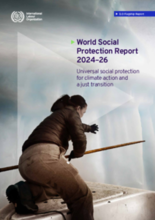Universal social protection systems have an important role to play to help realize climate ambitions and facilitate a just transition. With an especially sharp focus on the climate crisis and the exigency of a just transition, this report provides a global overview of progress made around the world since 2015 in extending social protection and building rights-based social protection systems. In doing so, it makes an essential contribution to the monitoring framework of the 2030 Agenda. And it calls on policymakers, social partners and other stakeholders to accelerate their efforts to simultaneously close protection gaps and realize climate ambitions.
The report found that in the 20 countries that are on the frontlines of the climate crisis more than 90 per cent of the population do not have access to any form of social protection cash benefit, be it child and family or unemployment benefits, or any support that can protect them from the ravages of climate change. In the 50 most climate-vulnerable countries, 75 per cent of the population – or 2.1 billion people – also lack any social protection.
Social protection continues to be elusive for 1.8 billion children
- Social protection remains elusive for the vast majority of children. For children aged 0 to 18 globally, 23.9 per cent receive a family or child benefit, meaning 1.8 billion children are not covered. For children aged 0 to 15, 28.2 per cent of children are covered, up by 6.1 percentage points since 2015. This equates to 1.4 billion children missing out.
- Fewer than one in ten (7.6 per cent) children aged 0 to 18 in low-income countries receive a child or family cash benefit, leaving millions xxiii Executive summary vulnerable to missed education, poor nutrition, poverty and inequality, and exposing them to long-lasting impacts. Children, especially those in poverty, are bearing the brunt of the climate crisis.
- The climate crisis has been described as structural violence against children, which compromises their well-being and prospects. This underscores the importance of making social protection systems more inclusive and resilient so that they continue to achieve their core objectives and support children’s additional needs due to climate change.
- Public expenditure on social protection for children needs to increase. On average, 0.7 per cent of GDP is spent on child benefits globally. Again, large regional disparities exist; the proportion ranging from 0.2 per cent in low-income countries to 1.0 per cent in high-income countries.

